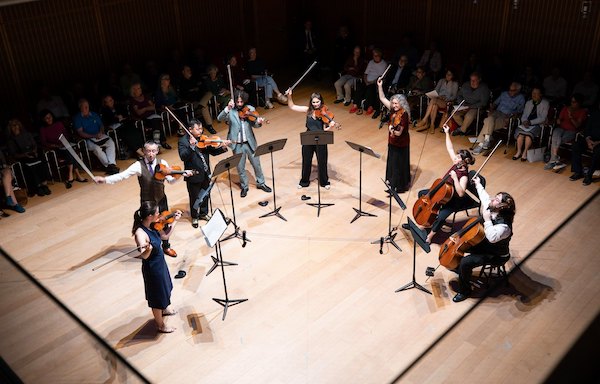Concert Review: A Far Cry’s Season Finale — The Ordinary Can Be Extraordinary
By Aaron Keebaugh
A Far Cry’s program of new and old music revealed that the simplest gestures can generate wonder.

A Far Cry performing in December, 2019. Photo: Facebook
“Did you ever stop to think about lampshades?,” violinist Jesse Irons asked the audience. For Irons and his colleagues in A Far Cry, the contemplation of the seemingly mundane is key to shaping musical inspiration.
Why? Because minute patterns can come together into something beautiful, even profound. That was the unifying theme of the conductor-less string orchestra’s season finale Friday night at Jordan Hall. Serene and sensitive in every way, A Far Cry’s program of new and old music revealed that the simplest gestures can generate wonder. Each score brimmed with an appreciation of the music’s finest particulars.
Composer Yaz Lancaster transforms musical ephemera into something well beyond the trivial. In the case of our streets, a recent commission for A Far Cry, they fashioned a gripping memorial to an American tragedy, a rumination on the horrors of the 1921 Tulsa race massacre. Their canvas achieves an uneasy stasis by weaving together a web of small phrases, glissandos, and even grooving bass lines. These are scattered about the ensemble. At the point an equilibrium is reached, through the use of powerful unison chords, a new idea would take hold and the process would begin anew. Rather than leaning into a reassuring sentimentality or suggesting a call to action, the 17-minute score poses questions without providing a resolution. The varied textures of our streets — darting hither and yon — keeps listeners fixated without becoming predictable. A Far Cry premiered this arresting piece with grace and conviction.
Shaw Pong Liu’s Arise, which opened the concert, supplied its own satisfying version of resolution through a generous use of space — both musically and physically.
Staged in the balconies and around the floor of the hall, the players tossed musical tweets and chirps at each other. These bird calls established an opening calm, supported by the musicians bowing the wood of their instruments to simulate deep breathing. But this meditative state (of nature?) doesn’t last. Gradually, noises interrupt the flow, first through vocalized calls, then by each player individually performing their own line — it is like listening to frustrated musicians who have become obsessed with their own practicing.
The chirps and vocalized harmonies seek a return to a Zen-like mood, but to little avail. Finally, the deep breathing returns to soothe the din in a wistful conclusion.
Liu’s music reminds us that there are many ways of becoming engrossed in the moment. A Far Cry struck a balance between sensitivity and activity to make a compelling case for this personal search for equanimity.
Benjamin Britten’s String Quartet No. 2, heard in Irons’s recent arrangement for string orchestra, also delivered solace.
With its mercurial moods, the original score generally eschews larger forces. But, while Britten’s sardonic wit may have been abandoned in favor of pastoral warmth, the orchestration made up for it with plushness and urgency.
In what felt like a nod to Henry Purcell, harmonies revolved around sustained pitches in the opening bars. The ensuing agitated theme emerged from the depths before splintering in all directions. Here, as earlier in the evening, the establishment of skittered aural space was a vital part of the performance.
The Vivace coursed with more assurance than insistence. The Chacony’s flowing momentum flowered from the fleeting arpeggios, rotating chords, and biting dissonances.
In Henry Purcell’s Fantasia Upon One Note, the Criers built a sturdy structure out of each passing wisp and fragment. The details may be small, and the effect may, at first, strike the listener as routine. But this music suggests that in the hands of extraordinary musicians and composers, even the most ordinary strains can mesmerize. All one must do is listen, carefully.
Aaron Keebaugh has been a classical music critic in Boston since 2012. His work has been featured in the Musical Times, Corymbus, Boston Classical Review, Early Music America, and BBC Radio 3. A musicologist, he teaches at North Shore Community College in both Danvers and Lynn.

